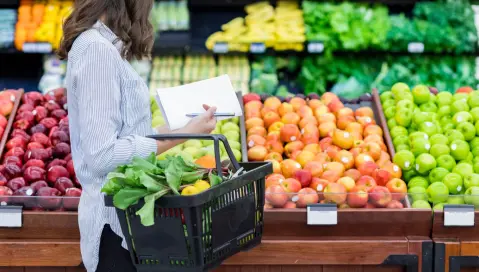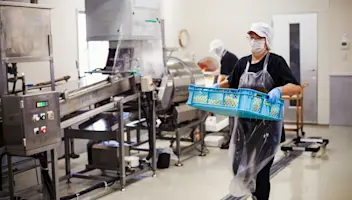Featured in this post
The Future of the Food Industry: Unveiling Insights From Aptean's Food and Beverage 2024 Trends Report
The Future of the Food Industry: Unveiling Insights From Aptean's Food and Beverage 2024 Trends Report
9 Nov 2023
Aptean Staff Writer
In the dynamic world of food and beverage, innovation, scalability and strategic decision-making are vital ingredients for success. As an industry professional, you know this reality well, and you must always have your finger on the pulse of the market to stay ahead of the competition.
To uncover insights that leaders like you need to drive growth, Aptean conducted an extensive survey in collaboration with B2B International to get a read on the thriving food processing, manufacturing and distribution sector in the UK and Ireland.
The result is the eagerly awaited Aptean Food and Beverage 2024 Trends and Outlook for the UK and Ireland report, which unveiled major industry trends that impacted businesses throughout 2023, from supply chain challenges to the growing importance of technology.
In this post, we’ll whet your appetite for the full report by sharing the five key findings from the research. By using these insights to inform your approach for the future, you can help maximise the chances your brand will continue to thrive going forward.
Trend No. 1: Food and Beverage Companies Are in a Growth Mindset
In the face of numerous challenges, the food and beverage industry in the UK and Ireland remains resilient and optimistic. According to our research, a remarkable 81% of food and beverage processors, manufacturers and distributors anticipate generating more revenue in 2023 than the previous year. Furthermore, 84% of companies expect to increase their profits.
These statistics reflect an industry that is not only weathering the storm but also thriving amidst adversity. However, it's important to acknowledge the obstacles faced by these companies.
Rising inflation and material prices, higher operating costs, changing consumer demands and material availability were identified in the report to be top challenges. Despite these hurdles, respondents’ answers reflected a determination to overcome them and embrace growth opportunities.
of food and beverage processors, manufacturers and distributors anticipate generating more revenue in 2023 than the previous year.
Trend No. 2: Automation Is Critical To Tackling Growth Barriers
In the quest for sustained growth and profitability, automation has taken centre stage in the UK and Ireland's food industry. 93% of surveyed companies are in the process of digital transformation and have realised the power of automation. By embracing technology and streamlining operations, these businesses have experienced significant revenue growth compared to those still reliant on manual operations.
The report explores the impact of this trend on revenue generation, highlighting that companies leveraging technology to automate tasks and processes achieved 1.8 percentage points higher revenue growth in the most recent full trading year. Electronic data interchange (EDI) solutions and product lifecycle management (PLM) software are among the specific systems delivering remarkable profit growth.
As companies plan for 2024, top technology investments include enterprise resource planning (ERP) platforms, overall equipment effectiveness (OEE) software and enterprise asset management (EAM). These robust technological solutions are key to unlocking operational efficiency, boosting productivity and driving growth in a fiercely competitive market.
Trend No. 3: The Automated Environment Is Driving Uptake of Business Intelligence Tools and Interest in Artificial Intelligence
In an era driven by data, food and beverage companies are recognising the need for enhanced visibility, accuracy and rapid access to vital information. The report reveals that 35% of businesses find it challenging to quickly obtain and analyse crucial data related to business performance and efficiency.
To overcome this hurdle, industry leaders are increasingly turning to business intelligence (BI) tools and artificial intelligence (AI) adoption. Investing in AI and BI tools empowers companies to make informed decisions, meet changing consumer preferences and improve operational efficiency.
Moreover, our research indicates a strong correlation between AI adoption and higher revenue and profit growth. By harnessing the power of data and advanced analytics, the UK and Ireland's food and beverage companies can gain a competitive edge in an ever-evolving market.
of businesses find it challenging to quickly obtain and analyse crucial data related to business performance and efficiency.
Trend No. 4: Supply Chain Resilience Is the Top Priority for 2024
The global disruptions faced by the food industry have underscored the critical importance of supply chain resilience. In response, UK and Irish food companies are prioritising supply chain enhancements, with 62% having already implemented technology-driven improvements within the past 12 months.
By leveraging supply chain visibility solutions, businesses strengthen their supplier networks, improve traceability and balance supply with demand. Forecasting features enable accurate demand prediction, supporting a resilient supply chain that can withstand challenges and disruptions.
Trend No. 5: Economic Goals Are Creating a Business Case for Sustainability Programmes
With sustainability becoming increasingly vital in all industries, it comes as no surprise that 85% of UK and Irish food processors, manufacturers and distributors are prioritisng sustainable initiatives. This commitment is driven not only by social responsibility but also by economic goals—the report revealed that efficiency improvements and reducing operational risks are the leading reasons behind the introduction of these efforts.
Our research shows that businesses committed to sustainability have experienced higher revenue and profit growth. Furthermore, their efforts open doors to new revenue streams by attracting environmentally conscious consumers who are willing to pay more for sustainable products.
Future-Proofing Your Business With Aptean Solutions
By applying a growth mindset and investing in technologies that enhance critical efforts—like supply chain visibility, manufacturing operations and workforce optimisation—food and beverage companies can drive significant improvements over the next five years.
When it comes to choosing a technology provider, Aptean should be at the top of your list, as we strive to act as a partner for each of our customers. Our dedicated professionals also know the food and beverage industry inside and out, which has afforded them in-depth expertise and knowledge of best practices.
What’s more, we offer a full range of food and beverage-specific solutions, including our award-winning ERP software, as well as the aforementioned OEE, EAM and PLM systems.
Download the full Aptean Food and Beverage 2024 Trends and Outlook for the UK and Ireland and discover how Aptean food and beverage solutions can accelerate business growth and help you succeed in a dynamic marketplace.
Finally, if you prefer to discuss your solution needs with one of our experts, reach out to us today and unlock the full potential of your food and beverage company with Aptean’s industry-specific software.
Related Articles





How To Thrive During Food and Beverage Market Turbulence
Prioritising modernisation, optimisation and a sound strategy is necessary for success in the food and beverage industry. Increase operational agility in a continually changing (and often unpredictable) manufacturing landscape.




